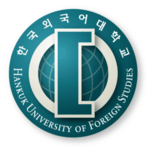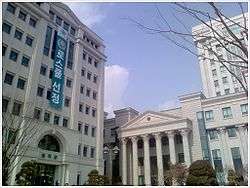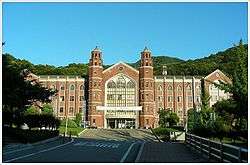Hankuk University of Foreign Studies
| 한국외국어대학교[1] | |
 | |
| Motto |
Veritas, Pax, Creatio Truth, peace, creation |
|---|---|
| Type | Private |
| Established | 1954 |
| President | Kim In-chul |
Academic staff | 613 |
| Students | 27,351 |
| Undergraduates | 23,661 |
| Postgraduates | 3,690 |
| Address | 서울특별시 동대문구 이문동 270 (270 Imun-dong, Dongdaemun-gu, Seoul) / 경기도 용인시 모현면 왕산리 산89( 89 San, Wangsan-ri, Mohyeon-myeon, Yongin-si, Gyeonggi-do), Seoul, Yongin, South Korea |
| Campus | Urban; rural |
| Website |
www |
| Hankuk University of Foreign Studies | |
| Hangul | 한국외국어대학교 |
|---|---|
| Hanja | 韓國外國語大學校 |
| Revised Romanization | Hanguk Oegugeo Daehakgyo |
| McCune–Reischauer | Han'guk Oegugŏ Taehakkyo |
Hankuk University of Foreign Studies (HUFS) is a private research university based in Seoul, Republic of Korea. The university was founded in 1954 to promote foreign language education in post-war Korea. The university is located in Seoul and Yongin. The name of the university is derived from the romanization of the Korean word hankuk (Korean: 한국; Hanja: 韓國) which means Korea.
The university is widely considered as one of the best private higher educations in South Korea, especially on foreign language and social science. Numerous diplomats and ambassadors are graduates of HUFS. It has a graduate school of interpretation and translation.
In 2007, HUFS won third place of Korean universities on the National Customer Satisfaction Index, and was placed second in terms of internationalization two years in a row in the university rankings of JoongAng Ilbo. The evaluation also ranked HUFS second in Korea for its research, faculty, reputation and alumni representation among schools without a medical school in 2008. In 2010, the university was ranked as the best Korean university on the subject of globalization in the QS World University Rankings.

History
Hankuk University of Foreign Studies was founded as a college for studying foreign languages in April 1954 by Kim Heung-bae with its first students studying English, French, Chinese, German, Spanish and Russian. Throughout the 1960s and 1970s, the college expanded its programmes and became a university in 1980.
.jpg)
In 1981, it opened its second campus in Yongin, a satellite city of Seoul.
In 2012, U.S President Barack Obama, during his visit to Korea, spoke at Hankuk University in Seoul about global progress toward nuclear non-proliferation.[2]
Campus

The university is composed of two campuses, the Seoul Campus located in the eastern region of Seoul, and its suburban campus in Yongin which is the Global Campus. Seoul Campus is the main campus of the university. It is located in Imun-ro, Dongdaemun District.
Global campus teaches additional languages not provided in Seoul, namely Polish, Romanian, Czech, Slovakian, Serbian, Croatian, Russian, Bulgarian, Hungarian, Central Asian Languages (Kazakh and Uzbek) etc. as well as most subjects on offer at the Seoul campus.
Colleges
Seoul Campus
- College of English
- Department of English Linguistics
- Department of English Literature and Culture
- Department of English for International Conferences and Communication(EICC)
- College of Japanese
- Division of Japanese Language, Literature and Culture
- Division of Integrated Japanese Studies
- College of Chinese
- Division of Chinese Language, Literature and Culture
- Division of Chinese Foreign Affairs and Commence
- College of Occidental Languages
- Department of French
- Department of German
- Department of Russian
- Department of Spanish
- Department of Italian
- Department of Portuguese(Brazilian)
- Department of Dutch
- Department of Scandinavian Languages
- College of Oriental Languages
- Department of Malay-Indonesian
- Department of Arabic
- Department of Thai
- Department of Vietnamese
- Department of Hindi
- Department of Turkish and Azerbaijani
- Department of Persian
- Department of Mongolian
- College of Social Sciences
- Department of Political Science and Diplomacy
- Department of Public Administration
- Journalism and Mass Communication Division (Journalism and Media Studies / AdvertisingㆍPublic RelationsㆍBranding / BroadcastingㆍFilmㆍNew Media
)
- College of Business and Economics
- Department of International Economics & Law
- Economics Division (Economics)
- College of Global Business Administration
- Business Administration Division (Business Administration)
- College of Education
- Department of English Education
- Department of Chinese Education
- Department of French Education
- Department of German Education
- Department of Korean Education
- Division of International Studies
- Division of Language & Diplomacy
- Division of Language & Trade
Global Campus
- College of Interpretation and Translation
- School of English for Interpretation and Translation (English-Korean Interpretation and Translation, Interpretation and Translation for International Trade and Relations in English-Speaking Area, English Literature and Culture Studies for Translation and Interpretation, English Linguistics)
- Department of German Interpretation and Translation
- Department of Spanish Interpretation and Translation
- Department of Italian Interpretation and Translation
- Department of Chinese Interpretation and Translation
- Department of Japanese Interpretation and Translation
- Department of Thai Interpretation and Translation
- Department of Arabic Interpretation and Translation
- Department of Malay-Indonesian Interpretation and Translation
- College of Central and East European Studies
- Department of Russian
- Department of Polish
- Department of Romanian
- Department of Czech and Slovak Studies
- Department of Hungarian
- Department of South Slavic Studies
- Department of Ukrainian Studies
- College of Languages and Literature
- Department of French
- Department of Portuguese and Brazilian Studies
- Department of Greek Studies and Bulgarian Studies
- Department of Indian Studies
- Department of Central Asian Studies
- African Studies Division (East African Studies, West African Studies, South African Studies)
- College of Humanities
- Department of Linguistics and Cognitive Science
- Department of Philosophy
- Department of History
- College of Economics and Business
- Department of International Business
- Department of Economics
- Department of Management Information Systems
- College of Natural Science
- Department of Mathematics
- Department of Statistics
- Department of Electronic Physics
- Department of Environmental Science
- Department of Bioscience and Biotechnology
- Department of Chemistry
- College of Information and Industrial Engineering
- Department of Computer Science and Engineering
- Department of Information Communications Engineering
- Department of Electronic Engineering
- Department of Digital Information Engineering
- Department of Industrial and Management Engineering
- Open Major Division of Humanities & Social Studies
- Open Major Division of Science & Engineering
- Division of International Sport & Leisure
Graduate School
Graduate School
- Humanities
- English Linguistics
- English Literature
- English Translation
- French Language and Literature
- German Language and Literature
- Russian Language and Literature
- Spanish Language and Literature
- TESOL (Teaching English to Speakers of Other Languages)
- Japanese Language and Literature
- Chinese Language and Literature
- Middle East Languages and Literature (Arabic Linguistics, Arabic Literature)
- Central and East European Languages and Literature
- Korean Language and Literature
- Comparative Literature
- Linguistics and Cognitive Science
- Philosophy
- History
- Information and Archival Science
- Global Culture & Contents
- Turkic·Central
- Social Science
- International Affairs
- Political Science and International Relations
- Public Administration
- Law
- Communication and Information
- International Economics and Law
- Economics
- Management
- Management Information Systems
- International Business
- Natural Science
- Mathematics
- Physics
- Chemistry
- Statistics
- Environmental Science and Engineering
- Bioscience and Biotechnology
- Engineering
- Information Communications Engineering
- Electronics Engineering
- Computer and Electronic Systems Engineering
- Industrial and Management Engineering
Graduate School of Interpretation and Translation
- The Master's Programs
- Two-Language Programs
- Korean-English
- Korean-French
- Korean-German
- Korean-Russian
- Korean-Spanish
- Korean-Chinese
- Korean-Japanese
- Korean-Arabic
- Three-Language Programs
- Korean-English-French
- Korean-English-German
- Korean-English-Russian
- Korean-English-Spanish
- Korean-English-Chinese
- Korean-English-Japanese
- Korean-English-Arabic
- Two-Language Programs
- The Doctoral Programs
- Korean-English
- Korean-French
- Korean-German
- Korean-Russian
- Korean-Spanish
- Korean-Chinese
- Korean-Japanese
- Korean-Arabic
Features of the education courses
Hankuk University of Foreign Studies has over 50 departments covering Social Sciences, Eastern European Studies, Humanities, Asia-African Studies, and Natural Sciences. The university contributes to regional studies, with graduate courses in international and regional studies.
Since 2004 the closely associated Cyber Hankuk University of Foreign Studies, based at Hankuk University of Foreign Studies, has been offering online courses in English, Japanese and Mandarin Chinese, as well as Business Administration and Journalism and Mass Communication.
HUFS runs a foreign language examination system (FLEX). The FLEX Center is developing examinations for 19 languages in addition to the seven languages currently administered (English, French, German, Russian, Spanish, Chinese, and Japanese). It plans for 26 languages more.[3]
As of October 2014, Hankuk University of Foreign Studies has academic exchange program agreements with 431 universities and 139 institutions throughout 88 nations.[4]
International exchange
- 3-3-3-3 Strategy: HUFS is implementing the '3-3-3-3 strategy' to cultivate future leaders. HUFS intends to increase the proportion of international faculty, lectures in foreign languages, international students, and Korean students studying abroad for at least one semester to over 30 percent.
- The 7+1 Visiting Student Program: Students study at an overseas university for at least one out of the eight semesters of their undergraduate years to gain a more international focus. HUFS provides support under the following three categories: 7+1 free-competition dispatch students(British-American zone), 7+1 dispatch students selected by departments and 7+1 dispatch students with superior entrance exam scores.
- Dual Degree Program: Under the dual degree program, students receive a degree from HUFS and another degree from the University of Delaware, pursuant to an agreement between the two universities.
- Student Exchange Program: Under the student exchange program, HUFS and a sister university overseas sign an agreement allowing for students from either institution to complete and receive academic credit for coursework taken on each other's campuses.
- Short-term Language Study Abroad Program: Language studies at an overseas four-year university can earn students up to nine credits at HUFS. The program allows students to strengthen their language capabilities as well as become more internationally minded.
- Self-financed Study Abroad Program: The Self-financed Study Abroad Program is a plan in which HUFS students may study in overseas universities and get the credits exchanged into the HUFS system. Since the student can choose any university (4-year colleges only) that the dean approves, there are more options compared to those on the Exchange or Visiting Student Program.
FLEX
Under the foreign language certification system, students who have double majors are required to achieve certain scores on the FLEX (Foreign Language EXamination) test for graduation, apart from graduation certification. In principle, students need to receive certification on their proficiency in foreign language. Many kinds of languages in FLEX: English, Chinese, Japanese, German, French, Russian, Spanish, Turkish, Indian, Vietnamese, Bulgarian, Hungarian, Polish, Italian, Dutch and so on.
Auxiliary educational organizations
- Foreign Language Testing and Training: The foreign language training institute was established in 1974 with support from the government and the Korea International Trade Association to provide language training to public officials and staff of companies who do business abroad.
- Center for Interpretation and Translation: The agency specializes in interpretation and translation studies.
- Center for Korean Language and Culture: The Center for Korean Language and Culture is an educational institute that provides Korean language education to help people from around the world to achieve a good command of Korean and a correct understanding of Korean culture while also nurturing Korean language teachers.
- i-HUFS Enterprise: A school-based business, i-HUFS Enterprise was founded in November 2003 to apply the knowledge and information about languages and culture that HUFS retains for the education of students and for study by professors toward research to develop educational programs that can generate profit.
- Global Leadership Academy: The Global Leadership Academy opened in 2001 to produce area experts based on education in 45 major languages used worldwide and the area studies programs available at HUFS.
- University Press Center: Established in 1954 together with the university, the University Press Center has published 39 foreign language dictionaries including Korea’s first Russian-Korean dictionary in 1963 and a ‘Practical Malay∙Indonesian-Korean dictionary’ in 2008.
- FLEX Center: The center was established to manage and operate FLEX(Foreign Language Examination). FLEX was developed by HUFS and is jointly administered with the Korea Chamber of Commerce and Industry. Tests are administered in seven languages: English, French, German, Russian, Spanish, Chinese, and Japanese.
- HUFS TESOL Professional Education Center: In response to the rising demand for English teachers equipped with language and teaching knowledge, the HUFS TESOL(Teaching English to Speakers of Other Languages) Professional Education Center was established as an independent education institution. The center offers all instruction required of English education professionals including teaching methods and application of theory to the field, as well as the evaluation, review, and production of learning materials in addition to English language training.
- Seoul Institute for Continuing Education: The Seoul Institute for Continuing Education was established in August 2010 to realize the philosophy of continuing education. It serves local communities by granting public access to HUFS teaching faculty and educational infrastructure.
HUFS alumni
Alumni who honored HUFS.
2009 Distinguished Alumni Award
- Lee Duk-sun: Dept. of German, Entering Class of '58
- Lee Yun-sung: Dept. of Spanish, Entering Class of '64
- Song Seung-whan: Dept. of Arabic, Entering Class of '76
2010 Distinguished Alumni Award
- Jung Eun-ah: Dept. of Korean Education, Entering Class of '84. She became a KBS announcer in 1990 through open recruitment.
- Choi Meng-ho: Dept. of Russia, Entering Class of '69. He entered the firm of newspaper(Dong-a daily news) in 1976, and became vice-president of Dong-a daily news.
- Ms.Cho Myung-deok: College of Law, honorary alumnus. She has made over all her property to the school. Her subscriptions amount to 4.5 billions.
Partner universities
There are 411 partner institutions in 93 nations.
Asia
Africa
Oceania
|
Europe
|
South AmericaNorth America
Middle East |
See also
- Public Relations
- Related Web Site
References
| Wikimedia Commons has media related to Hankuk University of Foreign Studies. |
- ↑ Abbreviations of Hankuk University of Foreign Studies in Korean: (한국) 외대((韓國) 外大; Hanguk Oedae). In English: HUFS
- ↑ President Obama Speaks at Hankuk University.
- ↑ FLEX, http://builder.hufs.ac.kr/user/hufsenglish/ac_5.jsp
- ↑ exchange program agreements, http://www.hufs.ac.kr/user/hufsenglish/index.html, viewed 05/08/2008
Coordinates: 37°35′50″N 127°03′31″E / 37.597215°N 127.058537°E